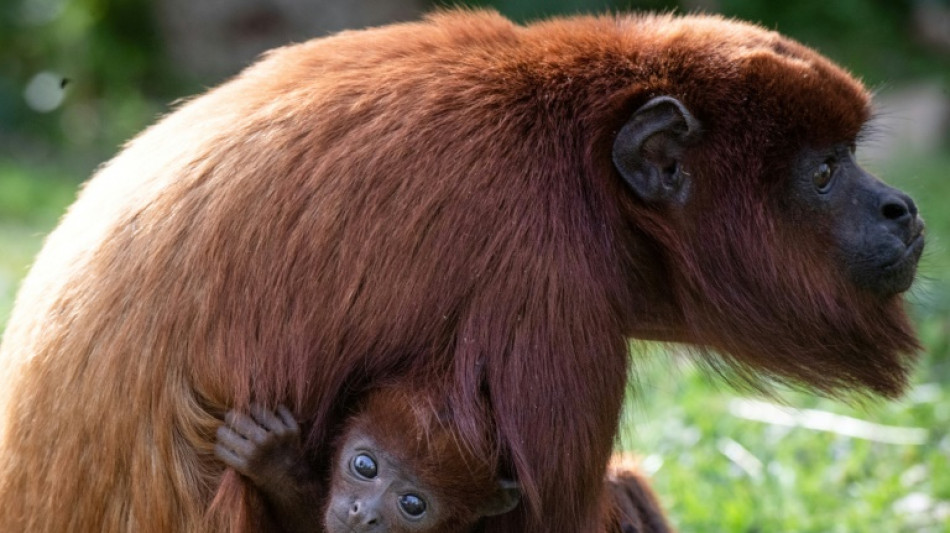
-
 Google must open Android to rival app stores: US court
Google must open Android to rival app stores: US court
-
Amazon profits surge 35% as AI investments drive growth

-
 Zelensky urges allies to seek 'regime change' in Russia
Zelensky urges allies to seek 'regime change' in Russia
-
Trump envoy to inspect Gaza aid as pressure mounts on Israel

-
 US theater and opera legend Robert Wilson dead at 83
US theater and opera legend Robert Wilson dead at 83
-
EA shooter 'Battlefield 6' to appear in October

-
 Heavyweight shooter 'Battlefield 6' to appear in October
Heavyweight shooter 'Battlefield 6' to appear in October
-
Justin Timberlake says he has Lyme disease

-
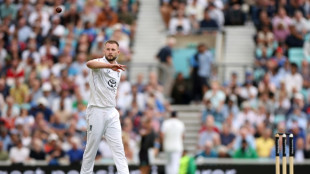 Atkinson and Tongue strike as India struggle in England decider
Atkinson and Tongue strike as India struggle in England decider
-
US theater and opera auteur Bob Wilson dead at 83

-
 Trump envoy to visit Gaza as pressure mounts on Israel
Trump envoy to visit Gaza as pressure mounts on Israel
-
In Darwin's wake: Two-year global conservation voyage sparks hope

-
 Microsoft valuation surges above $4 trillion as AI lifts stocks
Microsoft valuation surges above $4 trillion as AI lifts stocks
-
Verstappen quells speculation by committing to Red Bull for 2026

-
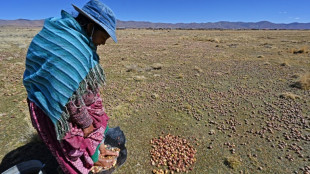 Study reveals potato's secret tomato past
Study reveals potato's secret tomato past
-
Trump's envoy in Israel as Gaza criticism mounts

-
 Squiban solos to Tour de France stage win, Le Court maintains lead
Squiban solos to Tour de France stage win, Le Court maintains lead
-
Max Verstappen confirms he is staying at Red Bull next year

-
 Mitchell keeps New Zealand on top against Zimbabwe
Mitchell keeps New Zealand on top against Zimbabwe
-
Vasseur signs new contract as Ferrari team principal
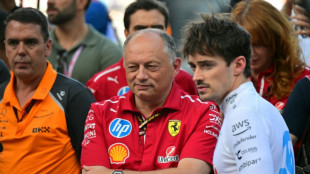
-
 French cities impose curfews for teens to curb crime
French cities impose curfews for teens to curb crime
-
Seals sing 'otherworldly' songs structured like nursery rhymes
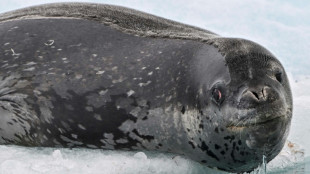
-
 India captain Gill run out in sight of Gavaskar record
India captain Gill run out in sight of Gavaskar record
-
Trump's global trade policy faces test, hours from tariff deadline

-
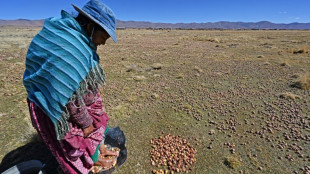 Study reveals potato's secret tomato heritage
Study reveals potato's secret tomato heritage
-
Wirtz said I would 'enjoy' Bayern move, says Diaz

-
 West Ham's Paqueta cleared of betting charges
West Ham's Paqueta cleared of betting charges
-
AI gives stocks a lift, dollar mixed tracking Fed, tariffs

-
 Authorities abandon recovery of German Olympian killed in Pakistan
Authorities abandon recovery of German Olympian killed in Pakistan
-
Talks over France, Lions game 'progressing': Benazzi

-
 Popovici ready to hit the beach after world swim sprint double
Popovici ready to hit the beach after world swim sprint double
-
Magic Marchand adds gold to world record as McIntosh wins again

-
 Sweden jihadist jailed for life over Jordan pilot burned alive
Sweden jihadist jailed for life over Jordan pilot burned alive
-
Zelensky signs bill ensuring anti-graft agencies' 'independence'

-
 Sleepless in Singapore: Marchand wins gold, day after world record
Sleepless in Singapore: Marchand wins gold, day after world record
-
England make early double strike in India series decider

-
 Popovici wins 100m freestyle world gold for sprint double
Popovici wins 100m freestyle world gold for sprint double
-
Marchand wins 200m medley gold, day after world record

-
 Thousands of Afghans scramble for chance to work in Qatar
Thousands of Afghans scramble for chance to work in Qatar
-
Trump's envoy arrives in Israel as Gaza criticism mounts

-
 McIntosh powers to third gold of worlds, 12-year-old Yu fourth
McIntosh powers to third gold of worlds, 12-year-old Yu fourth
-
Hong Kong sees 3.1% growth in second quarter

-
 Stocks, dollar mixed tracking Fed, tariffs, results
Stocks, dollar mixed tracking Fed, tariffs, results
-
World Athletics brings in gene tests for female category eligibility

-
 Trump says tariffs are making US 'great & rich' again
Trump says tariffs are making US 'great & rich' again
-
Pakistan opposition leader given 10 years for Imran Khan protests

-
 India's Bumrah out of Oval finale as England bowl in fifth Test
India's Bumrah out of Oval finale as England bowl in fifth Test
-
Rights groups urge Nepal to reverse Telegram ban

-
 BMW says can weather tariff storm despite profit plunge
BMW says can weather tariff storm despite profit plunge
-
Zelensky urges allies to push for 'regime change' in Russia

| SCU | 0% | 12.72 | $ | |
| RBGPF | 0.52% | 74.42 | $ | |
| RYCEF | 7.62% | 14.18 | $ | |
| CMSC | 1.09% | 22.85 | $ | |
| BCC | -1.29% | 83.81 | $ | |
| NGG | 0.28% | 70.39 | $ | |
| BCE | -0.86% | 23.33 | $ | |
| CMSD | 0.9% | 23.27 | $ | |
| RIO | 0.47% | 59.77 | $ | |
| SCS | 0% | 10.33 | $ | |
| JRI | 0.15% | 13.13 | $ | |
| RELX | 0.21% | 51.89 | $ | |
| VOD | -2.31% | 10.81 | $ | |
| AZN | -4.79% | 73.09 | $ | |
| BTI | 0.97% | 53.68 | $ | |
| GSK | -4.9% | 37.15 | $ | |
| BP | -0.31% | 32.15 | $ |

More protected areas won't save biodiversity, warn experts
Expanding nature preserves will not be enough to stem a rising tide of extinctions, a panel of experts warned Wednesday, taking aim at a draft treaty tasked with rescuing Earth's animal and plant life.
Setting aside at least 30 percent of both land and oceans as protected zones is the cornerstone target of the so-called global biodiversity framework to be finalised in May at UN negotiations in Kunming, China.
But a report by more than 50 top experts said the draft plan still falls far short of what is needed.
"We're in the middle of a biodiversity crisis, with a million species at risk of extinction," lead author Paul Leadley, a professor at Paris-Saclay University, told AFP.
"There's good evidence that we will fail again to meet ambitious international biodiversity objectives if there's too much focus on protected areas at the expense of other urgent actions."
The plan, under negotiation by nearly 200 nations, sets a score of targets for 2030 -- and aims by 2050 to reverse biodiversity loss and be "living in harmony with nature."
The world failed almost entirely to reach a similar set of 10-year objectives set a decade ago at UN talks in Aichi, Japan.
"We keep trying to treat a critically ill patient with plasters -- that has to stop," said Leadley.
Echoing a similar warning issued by the UN's science advisory panel for climate change, Leadley and his colleagues said reversing the damage done to nature will require "transformative change" in society, starting with the way we produce and consume food.
- Multiple drivers -
Policymakers must also realise that all the drivers of extinction -- habitat loss and fragmentation, over-hunting for food and profit, pollution, the spread of invasive species -- must be tackled at once.
"Biodiversity loss is caused by multiple direct drivers in nearly all cases, meaning that actions on only one or a few will be insufficient to halt continued loss," the report said.
Climate change is also rapidly emerging as a major threat to many animal and plant species on land and in the oceans, outpacing their ability to adapt.
Limiting global warming to 1.5 degrees Celsius above preindustrial levels -- "essential" for protecting nature -- is not adequately reflected in the draft targets, the authors say.
Earth's surface has already warmed 1.1C, enough to unleash a crescendo of climate-enhanced storms, heatwaves, droughts and flooding.
And it works both ways, the report warns: "Protecting and restoring biodiversity are key to achieving the climate mitigation and adaptation goals of the Paris Agreement."
- Nature-based solutions -
As with climate, there's no time to lose.
"The sooner we act the better," said co-author Maria Cecilia Londono Murcia, a researcher at Humboldt Institute in Colombia.
"Time lags between action and positive outcomes for biodiversity can take decades."
The report also takes the draft treaty to task for not spelling out how goals will be achieved and enforced.
Targets are all well and good, it suggests, "but it is how these targets are implemented ... that will determine success."
Other targets set for 2030 include:
- reducing by 50 percent the rate at which alien species are spreading across the globe;
- reducing nutrients such as fertiliser leaching into the environment by at least half, and pesticides by at least two-thirds;
- eliminating the discharge of plastic waste;
- using nature-based solutions to cut greenhouse gas emissions by at least 10 billion tons of CO2 or its equivalent;
- reducing subsidies that harm biodiversity by at least $500 billion (440 billion euros) per year.
"For every euro we spend globally to help biodiversity, we spend at least five on things that destroy it," said co-author Aleksandar Rankovic, a researcher at the Paris Institute of Political Studies.
Nations will gather in Geneva in March for technical meetings ahead of the crunch talks in April and May.
F.Pedersen--AMWN